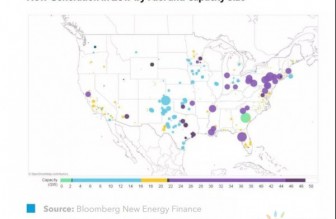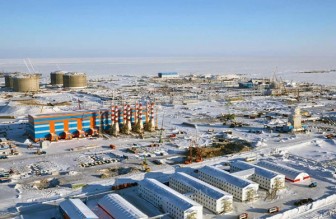訊 據網站7月27日消息 加拿大會(hui) 議委員會(hui) 和加拿大液化天然氣聯盟資助的一份新報告稱,不列顛哥倫(lun) 比亞(ya) 省每年5600萬(wan) 噸的液化天然氣行業(ye) 將創造近10萬(wan) 個(ge) 就業(ye) 崗位。
對於(yu) 附近的阿爾伯塔省來說,在反輸油管道運動下苦苦掙紮的阿爾伯塔省,在獲得利潤的同時,整個(ge) 加拿大的10萬(wan) 個(ge) 工作崗位,不僅(jin) 僅(jin) 是在不列顛哥倫(lun) 比亞(ya) ,可能無法彌補在不列顛哥倫(lun) 比亞(ya) 省與(yu) 急需的跨山輸油管道進行激烈鬥爭(zheng) 後,其從(cong) 油砂作業(ye) 中損失的擴大。
對不列顛哥倫(lun) 比亞(ya) 省來說,這將是一個(ge) 甜蜜的勝利,因為(wei) 它將獲得超過三分之二的就業(ye) 機會(hui) 。
除了就業(ye) 機會(hui) ,液化天然氣行業(ye) 的工資總額將增加60多億(yi) 美元(不列顛哥倫(lun) 比亞(ya) 省為(wei) 46億(yi) 美元),並使加拿大的國內(nei) 生產(chan) 總值每年增加110億(yi) 美元。報告稱,各省可獲得超過1080億(yi) 美元的省級財政收入,其中940億(yi) 美元將用於(yu) 不列顛哥倫(lun) 比亞(ya) 省。
聯邦政府將獲得大約640億(yi) 美元的額外收入。
根據《新興(xing) 浪潮:不列顛哥倫(lun) 比亞(ya) 省液化天然氣行業(ye) 的經濟影響》的報告,液化天然氣行業(ye) 的成本約為(wei) 5000億(yi) 美元,時間跨度超過40年。
不列顛哥倫(lun) 比亞(ya) 省和阿爾伯塔省之間的鬥爭(zheng) 已經持續了多年,以阿爾伯塔的石油為(wei) 中心,有一條必須貫穿的管道。這一分歧引發了訴訟和石油儲(chu) 備的威脅,聯邦政府陷入了困境。
不幸的是,加拿大近年來在推動能源項目方麵並沒有很好的記錄,雄心勃勃的液化天然氣行業(ye) 帶來的挑戰比解決(jue) 方案還多。
王磊 摘譯自 今日油價(jia)
原文如下:
LNG Industry Could Bring 100,000 Jobs To Canada
A new report by the Conference Board of Canada, and funded by the Canadian LNG Alliance, determined that a 56-million-tonnes-per-year LNG industry in British Columbia would generate nearly 100,000 jobs.
For nearby Alberta, who has struggled under the anti-pipeline movement to get its oil its primary market, the United States, while turning a profit, those 100,000 jobs—in Canada as a whole, not just in B.C.--may not make up for what it lost from oilsands operations after B.C. fought tooth and nail against the much-needed Trans Mountain pipeline expansion.
For B.C., who would be the recipient of more than two-thirds of those jobs, it would be sweet victory.
In addition to the jobs, total wages from an LNG industry would be boosted by more than $6 billion ($4.6 billion for B.C.), and increase Canada’s GDP by $11 billion annually. More than $108 billion in provincial revenue could be generated for the provinces, according to the report, with $94 billion of it going to B.C.
The federal government would receive about $64 billion in additional revenue.
Of course, that LNG industry would come at a cost—of about $500 billion, spread over more than forty years, according to the report “A Rising Tide: The Economic Impact of B.C.’s liquified natural gas industry”.
The war between B.C. and Alberta has been raging for years, centered around Alberta’s oil and a pipeline that must run through B.C. The disagreement has sparked threats of lawsuits and withholding the oil, with the federal government caught in the middle.
Unfortunately for Canada, it doesn’t have a great track record in recent years for getting energy projects off the ground, and an ambitious LNG industry poses more challenges than solutions.













